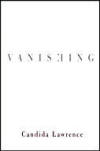Vanishing
Candida Lawrence’s fourth collection of memoirs feels real and honest. From the opening chapter on her first college level paper to the closing chapter on her eighty-four-year-old sister’s unpredictable romance, Lawrence seems to tell it how it is, although she considers herself “the one in the family who is a veteran embroiderer on reality’s edges.”
Candida Lawrence’s fourth collection of memoirs feels real and honest. From the opening chapter on her first college level paper to the closing chapter on her eighty-four-year-old sister’s unpredictable romance, Lawrence seems to tell it how it is, although she considers herself “the one in the family who is a veteran embroiderer on reality’s edges.”
Perhaps the feeling of truth is all a credit to Lawrence’s talent for writing intriguing and beautiful biographical prose. After all, the first chapter could be an essay on creative non-fiction. In “Everything She Does, and Says, and Is;” Lawrence is a young college student, asked to write 1,000 words on a member of her family. She knows she should write “a Reader’s Digest saccharine ode to a member of one’s family,” but can’t bring herself to write what is expected of her because she dislikes “every member” of her family. She has a particular grudge against twisting the real truth to create a fictional truth, due to her famous journalist father’s articles with her as the primary subject. “He came in free,” she writes, “in a newspaper, a place where I fervently believe truth must live, with fiction about a real daughter.” Lawrence includes examples of her father’s essays with her version of the truth as a rebuttal. Her version is more direct, less pretty, and thus, more real. Or so her straightforward and harsh writing style makes us believe.
The reason Lawrence refers to herself as an “embroiderer on reality’s edges” is because of the perfection she attained in the “art of lying” when she kidnapped her own children. Her third chapter, “Vanishing: 1965,” reads as a how-to guide to disappearing with your children. Brilliant and brutal, Lawrence details the steps taken in order to remove her children from a home with a verbally abusive and inappropriately intimate father. Written in the second person point of view (“While you are still in the life you are leaving, the Before, you will be acting a role . . . There will be a lot more lying in your future.”), she sounds like an expert, a professional. The authoritative voice Lawrence adopts here adds to the truthful and honest feel of the book.
Whether Candida Lawrence is subdued and factual, as in the reliving of her abortion, or surreal and absurd, like her rendition of the death of an Ortolan Bunting, her memoirs are as fascinating as fiction while maintaining an almost unprecedented feeling of complete and utter reality. And our response is similar to hers when she is at one point faced with an interesting comment from a friend: “Should I congratulate him for his honesty, slug him for his rudeness, try to walk away, faint with shock?”





